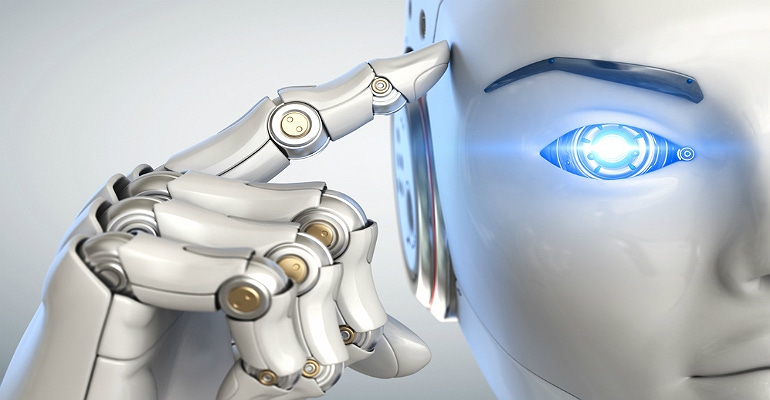Business leaders across industries know AI can bring about business outcomes today and disruption tomorrow.

For many, artificial intelligence (AI) stirs images of a futuristic cyborg (like the one pictured above), but business people know that the groundbreaking technology is here today. The smartest ones have already put it to work.
Forrester reports that 63 percent of business technology decision makers – mostly chief data officers and chief analytics officers – are implementing, have implemented, or are expanding AI in their businesses. Nearly 60 percent say changing their business with AI over the next 12 months is a high, or critical, priority.
Along these lines, a PwC report found that 72 percent of business executives believe AI will be the business advantage of the future. All tallied, the global AI spend will reach $15.7 trillion by 2030, with entire nations sparring over AI dominance.
This year, PwC predicts AI will “get down to earth” and help companies in all sorts of ways, such as making their big-data bets pay off and guarding against cyberattacks.
These predictions about AI are “informed by what our leaders in assurance, consulting, and tax see on the ground with clients around the world who are grappling with how to put AI to work in their organizations and prepare their employees for a world in which AI is everywhere,” PwC states.
But where, exactly, is AI today?
In a Harvard Business Review article this month, “Artificial Intelligence for the Real World,” Thomas H. Davenport and Rajeev Ronanki identify three types of AI: process automation typically for back-office administrative and financial activities; cognitive insight, which the authors call “analytics on steroids” for detecting patters in vast data sets; and cognitive engagement, such as chatbots and intelligent agents.
Market-research firm Ovum breaks down AI use cases by industry. Here are a few of them:
Retail: order management and fulfillment, merchandizing, pricing and promotions
Insurance: fraud, digital channels, marketing
Health care: digital imaging, patient relationship management, medical records
Government: citizen self-service, citizen relationship, payments
Media: data management, programmatic marketing, content delivery
Utilities: data management, customer experience, smart grid
Banking: digital banking, cybersecurity, risk management
Each industry has roadblocks to AI adoption, largely based on their maturity level, according to a recent McKinsey & Company article, “Artificial Intelligence: The Time to Act Is Now.” The industrial sector, for instance, has huge AI potential, but member companies remain resistant. That’s a far cry from the automotive industry, which is accelerating toward the driverless AI car.
“For producers of AI products and services, this means that value capture will be staggered, with some industries initially producing higher returns than others,” say the McKinsey authors.
Tom Kaneshige writes the Zero One blog covering digital transformation, AI, marketing tech and the Internet of Things for line-of-business executives. He is based in Silicon Valley. You can reach him at [email protected].
About the Author(s)
You May Also Like


